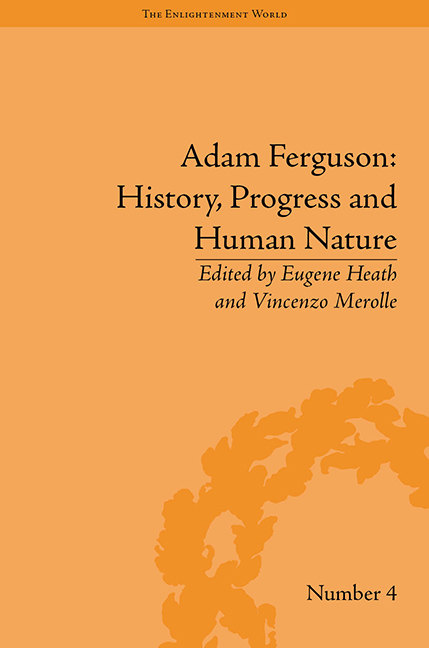Book contents
- Frontmatter
- CONTENTS
- Contributors
- Introduction
- I Life and Works
- II In History
- III On History
- IV Human Nature, Action and Progress
- 9 Ferguson's Politics of Action
- 10 Ferguson and the Active Genius of Mankind
- 11 Providence and Progress: The Religious Dimension in Ferguson's Discussion of Civil Society
- Notes
- Works Cited
- Index
9 - Ferguson's Politics of Action
from IV - Human Nature, Action and Progress
- Frontmatter
- CONTENTS
- Contributors
- Introduction
- I Life and Works
- II In History
- III On History
- IV Human Nature, Action and Progress
- 9 Ferguson's Politics of Action
- 10 Ferguson and the Active Genius of Mankind
- 11 Providence and Progress: The Religious Dimension in Ferguson's Discussion of Civil Society
- Notes
- Works Cited
- Index
Summary
‘That man is not made for repose’ is a major conclusion of Adam Ferguson's analysis of human nature and of human history. Men act or languish; nations are at best ‘forward, enterprising, inventive, and industrious’, at times suffer ‘periods of remissness’, and at worst decline and die. The need and the desire for action are common to men and beasts, but they are interwoven into human history in ways unique to the species. To begin with, human exertion is the fundament of society and polity. Yet human motives – such as ambition and avarice – may overturn political structures and reduce liberty. In modern times, safety and well-being can render physical exertion elective and induce political laziness, causing corruption and decline. Commercial societies also run the risk of departmentalizing human actions in a way that may – but need not – threaten active political virtue, which Ferguson took to be man's highest end.
Ferguson's philosophy of action is not part of a metaphysical system. Unlike his good friend David Hume, he did not create a theory of passion, action and effect. Still less does his work constitute an early contribution to analytic philosophy of action of the twentieth-century brand. His aim, in An Essay on the History of Civil Society (1767) and in the Principles of Moral and Political Science (1792), was twofold: to offer a descriptive natural history of the human species, and to interpose it with a civil history of human societies with a prescriptive core. Thus, his description of active human nature led to a normative analysis of action in society, ripening into an assertion of the importance of public commitment requisite from citizens of a good polity. The normative aspect of his writings, indeed, stretched beyond the extrapolation of what needs to be done: his texts and lectures were themselves intended as a mind-enhancing and politically affective enterprise, an action through words. Most of his major works, including the Essay, the Roman Republic, the Principles and many of the essays, could be read in context as essayistic political acts, rather than mere intellectual exercises in system-making.
Ferguson lived up to his creed; his own public exertions, from the Black Watch chaplaincy through the Carlisle Commission, place him among the politically active thinkers of the Scottish Enlightenment, of which he was arguably the most military-minded.
- Type
- Chapter
- Information
- Adam FergusonHistory, Progress and Human Nature, pp. 147 - 156Publisher: Pickering & ChattoFirst published in: 2014



